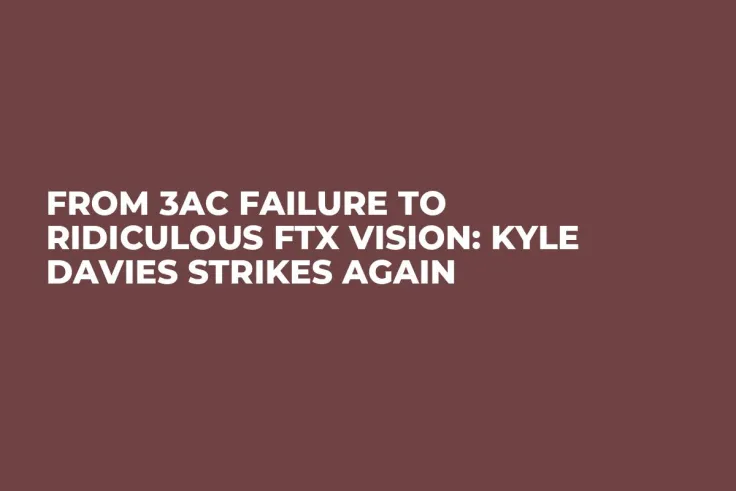
Disclaimer: The opinions expressed by our writers are their own and do not represent the views of U.Today. The financial and market information provided on U.Today is intended for informational purposes only. U.Today is not liable for any financial losses incurred while trading cryptocurrencies. Conduct your own research by contacting financial experts before making any investment decisions. We believe that all content is accurate as of the date of publication, but certain offers mentioned may no longer be available.
When it comes to tumultuous trajectories in the world of cryptocurrency, few stories compare to that of FTX's sudden decline. This was compounded by Kyle Davies, the cofounder of 3AC, suggesting an audacious plan for the beleaguered platform. Given 3AC's disastrous track record, Davies' announcement could not have been more out of touch with reality.
In a quick recap, 3AC's catastrophic implosion resulted in the evaporation of millions in investor funds. This debacle is well documented in the annals of crypto history, and for Davies, who was at the helm of this fiasco, to provide "guidance" for another platform in distress is both audacious and alarming.
If I still had 10b, the first thing I'd do is buy FTX and switch it back on. The playbook's clear. Couple tweaks - close Alameda, run the investment side more like 3AC, slash the amphetamine budget. Otherwise it'd be the same best in class user first product. Run it back turbo.
— Kyle Davies 🐂 (@KyleLDavies) August 8, 2023Ripple Partners With Deutsche Bank, $2 Billion in Bitcoin Scooped by Whales, Schwartz Criticizes Logan Paul, Shiba Inu Price Enters Consolidation — Top Weekly Crypto News Crypto Market Review: Shiba Inu Price Momentum Returns In New Uptrend, Is Ethereum (ETH) Stuck in the Mud? Bitcoin Isn't Giving Up on $70,000
November 2022 was particularly brutal for FTX. The saga began with Zhao announcing Binance's intention to offload its holdings in FTT, which triggered a sharp decline in the token's price, accentuated by low trading volumes and palpable hostility between Zhao and Bankman-Fried.
The ripple effects were profound: FTT lost 80% of its value in just one day, with $6 billion in withdrawals from FTX. This financial hemorrhage was so intense that Binance, in an effort to guarantee customers' fund recoveries, entered into a preliminary agreement to buy FTX.
However, the deal was shortlived. The state of FTX's finances, coupled with investigations into FTX's links with Bankman-Fried's other enterprises, cast a cloud over the proposed acquisition. Binance ultimately withdrew from the agreement, leaving FTX to grapple with its mounting challenges, including a lack of liquidity.
As the crisis unfolded, FTX's moves became increasingly desperate. Talks with Kraken for a potential rescue deal, a bid to secure $10 billion in emergency financing and a series of high-profile resignations all pointed to an enterprise on the brink of collapse.
Against this grim backdrop, Davies' recent pronouncements about what he would do if he had $10 billion — namely, buying FTX, tweaking its operations and reverting it to a model resembling 3AC — appear not just imprudent but borderline delusional. Given the outcome of the 3AC venture, such suggestions hardly inspire confidence.

 Vladislav Sopov
Vladislav Sopov Dan Burgin
Dan Burgin